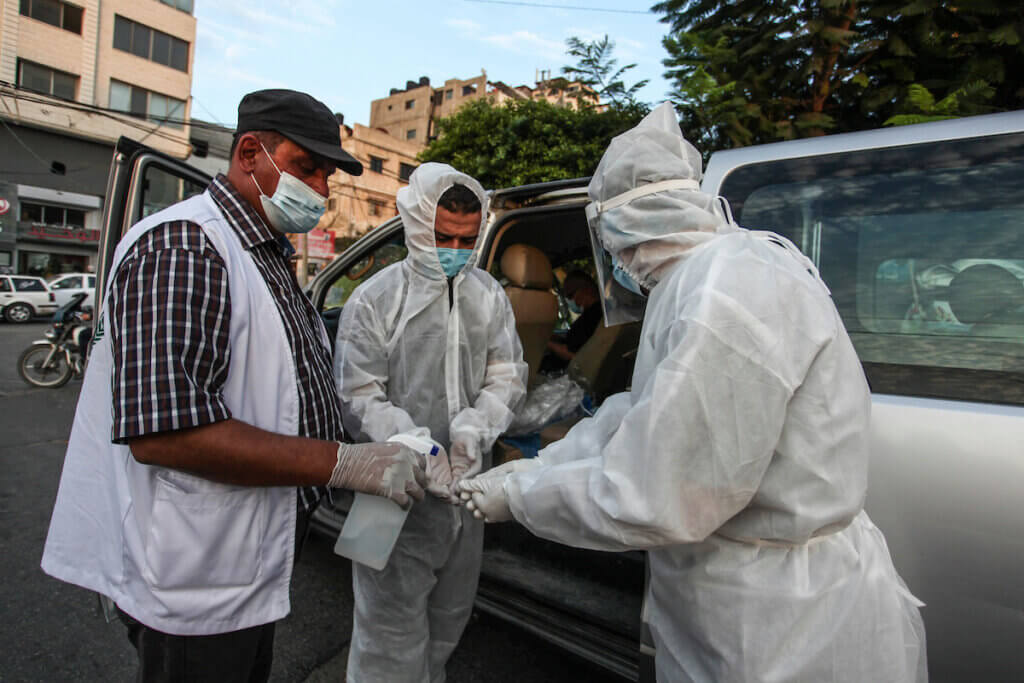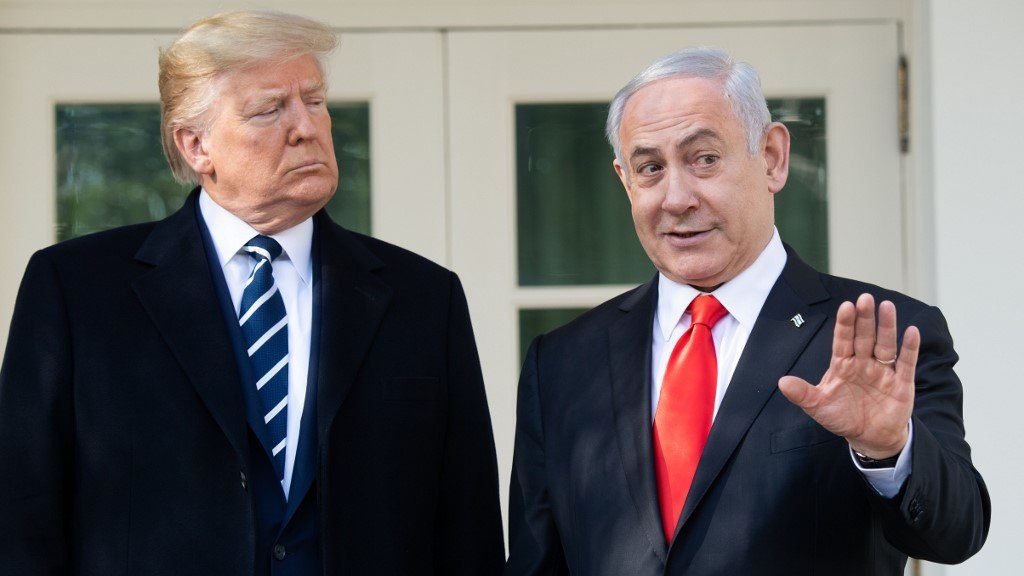Palestinians receive the coronavirus vaccine at a UNRWA clinic in Gaza City on July 27, 2021. (Photo: Ashraf Amra/APA Images)
The Latest:
- 345,328 Palestinians tested positive for COVID-19; 340,287 recoveries; 3,869 deaths
- Of those who tested positive, 200,260 live in the West Bank, 116,227 live in Gaza, and 28,841 live in East Jerusalem
- 869,063 Israelis tested positive for COVID-19; 847,076 recoveries; 6,466
Israelis over 60 will receive a third coronavirus vaccine, or booster shot, after new cases skyrocketed from an outbreak of the more contagious Delta variant. The move comes two weeks after Israel began giving additional doses to critical patients and those with serious preexisting conditions.
Israel’s Prime Minister Naftali Bennett told reporters today, “Israel has already vaccinated 2,000 immunosuppressed people with a third dose with no severe adverse events. And now we’re rolling out a national third dose campaign.”
The new protocol comes one day after Israeli and Palestinian health officials met to discuss giving a third dose to Palestinians whose first shot was administered at least 6 months ago. Health officials also discussed extending vaccines to pregnant women and children as young as 12, who were both previously ineligible.
While it’s unclear whether or not Palestinians will adopt these measures, as of now most of the Palestinian population is not fully vaccinated. In fact, according to the ministry of health, only 412,136 have received both jabs.
In the same meeting, Israeli health officials said they would recognize Palestinian vaccine certificates in its green pass system. Mai al-Kaila, the Palestinian minister of health, said Wednesday “In addition to recognizing the Palestinian vaccination certificate,” Israel will also recognize the “the certificate signifying a negative PCR test sealed by the Palestinian ministry of health.”
The big picture: While we don’t exactly know how this will play out, it looks as though Palestinian healthcare workers could receive a booster vaccine before a majority of the general public have received one shot.

Palestinian doctors take a swab sample from a man in a public park during a COVID-19 screening campaign in Gaza City on Sept. 20, 2020. (Photo: Mahmoud Ajjour/APA Images)
Palestinian healthcare workers bought their own PPE, and were sent to patient homes without it
Buying their own PPE, living in hotels, and afraid of transmitting COVID-19 to their patients. This week we’re looking at Palestinian healthcare workers and the risks and isolation they endured over the last year and a half since the pandemic began.
Earlier this month Medical Aid for Palestine released a briefing paper that distilled interviews with 17 doctors, nurses, lab techs, and paramedics in the West Bank, Gaza, and East Jerusalem who gave previously unreported insights into the challenges for Palestinians practicing medicine. Not all of the medical professionals in the study treat coronavirus patients, but each were impacted by the disease.
One physician from the West Bank city of Nablus told researchers she was made to conduct home visits early in the pandemic, without PPE. It was “one of the most stressful moments in my career,” she told MAP, adding, “I was scared as I did not have enough information regarding the virus nor regarding treating or examining COVID-19 patients. I begged my supervisor not to send me, but these were the instructions. If I wouldn’t go, I would receive a formal warning. When I arrived at the home of my first COVID-19 patient, I cried. I remembered my daughters. I was very scared of getting infected and infecting them.”
Similarly, an emergency responder in Gaza said:
“I am on the front line. My work requires coming into contact with COVID-19 patients and transferring them to quarantine centers or hospitals. I had to buy my masks and gloves. I was very stressed about getting infected and infecting my family. My wife and I live with my parents, I was stressed about infecting my pregnant wife and my father, he has a respiratory disease.”
Other healthcare workers with adequate access to PPE shared the stress of exposing themselves and their families to COVID-19. An oncologist in Gaza said:
“I was very worried of transmitting the virus to my family, especially to my six-year-old autistic daughter. I taught my five children how to take all preventable measures, but I knew that the chances of me bringing the virus into my home and infecting my kids were higher. What an intolerable guilt.”
Gaza is at particularly high risk for spreading the coronavirus inside of a household. The report noted, of those who were ordered to isolate at home, 50% did not have separate bedrooms for uninfected people.
In East Jerusalem, physicians who live in the West Bank found themselves unable to commute across checkpoints when closures were enacted by Israel and the Palestinian Authority banning movement between districts. Hospitals then moved their medical teams into hotels.
“It was a relief to know that I wouldn’t infect my family or have to go through several checkpoints on my way to work, but I felt isolated and lonely,” one physician said. “I stayed in Jerusalem for three months without visiting my family.”
That’s it for this week. We’ll see you all next Friday.
Mondoweiss covers the full picture of the struggle for justice in Palestine. And for the next 10 days, every dollar you give will be doubled, up to $50,000, to support our unique journalism. Read by tens of thousands of people each month, our truth-telling journalism is an essential counterweight to the propaganda that passes for news in mainstream and legacy media.
Our news and analysis is available to everyone – which is why we need your support. Please contribute so that we can continue to raise the voices of those who advocate for the rights of Palestinians to live in dignity and peace.
Palestinians today are struggling for their lives as mainstream media turns away. Please support journalism that amplifies the urgent voices calling for freedom and justice in Palestine.
Related posts:
Views: 0
 RSS Feed
RSS Feed

















 July 31st, 2021
July 31st, 2021  Awake Goy
Awake Goy 





 Posted in
Posted in  Tags:
Tags: 
















